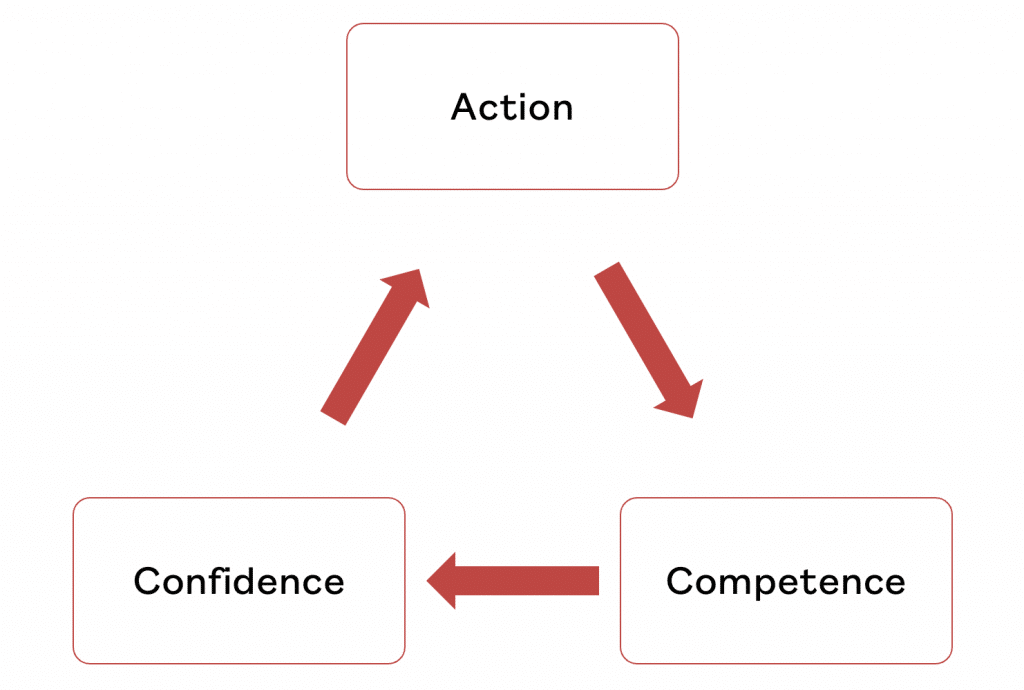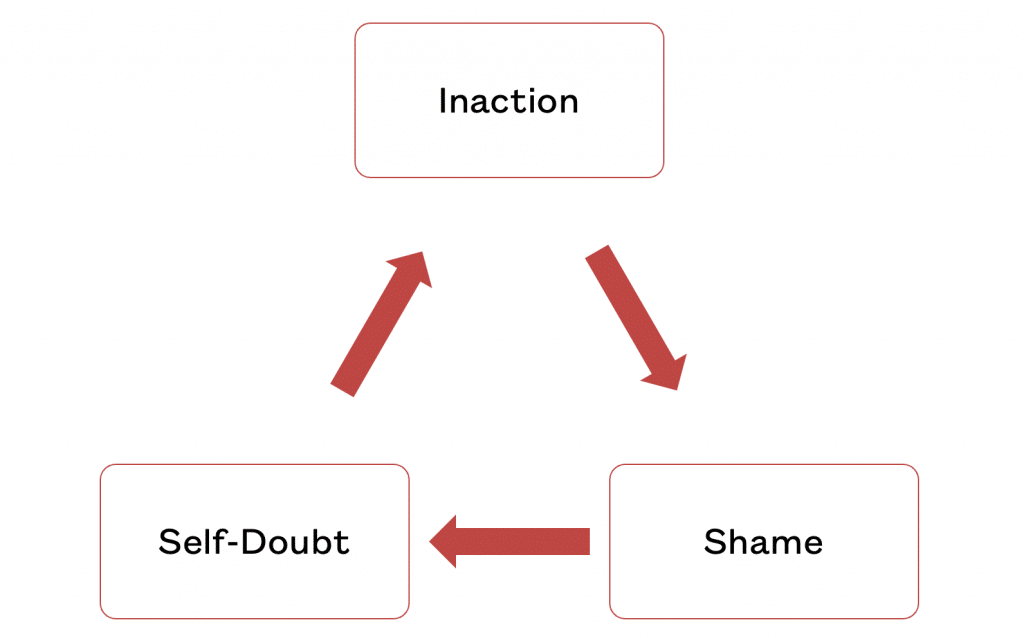There is much written about the “confidence gap” these days. That is, the gap between the confidence level of women or other minority populations and their white male counterparts. I observe it often in my coaching practice. For example, when I interview partners for feedback on high-potential women senior associates, I often hear, “She is a Rockstar. In fact, she is more competent than her male colleagues but she doesn’t speak up as often.”
Moreover, I notice that many women are exhausted from intermittent or persistent feelings of self-doubt. In a recent WLF closing session, 7 out of 10 high-performing (Rockstar!) associates said the one attribute they most wanted to leave behind was self-doubt.
By now, we know that there are many varied and complex factors that contribute to the confidence gap. One factor we don’t talk enough about is that women and other minority groups in Big Law may not feel as “psychologically safe” as their white male counterparts.
As a woman lawyer, ask yourself whether the following scenario is familiar:
You are the only woman on a Zoom meeting with six male partners. You are discussing the terms of a large financial services transaction. You see that the group is missing an important consideration. You don’t say anything because you are not 100% sure you are right, and the men are talking over each other. Fifteen minutes pass, and one of the senior male partners raises the very issue you were thinking about. The group agrees completely with the senior male partner, and remarks on what an important save that was. You feel frustrated and mad at yourself for not speaking up.
What kept you from speaking up? What would be different if you felt safer to express your opinions? What would make it easier to speak up next time? How would the group have benefited from your contributions?
The Center for Creative Leadership defines psychological safety as “the belief that you won’t be punished or humiliated for speaking up with ideas, questions, concerns, or mistakes.”
It goes without saying that many law firms are not bastions of psychological safety for men or women. The often perfectionist, high stress, fast paced environments in many law firms, along with opaque or absent feedback systems, foster psychological insecurity in many people. However, for women and other minority populations, the feeling of psychological insecurity is magnified for all the reasons we know – few, if any, role models and mentors, conscious and unconscious bias, etc. In fact, in a recent New York Times article, Modupe Akinola, an Associate Professor of Management at Columbia University Business School explains, “Just by nature of being one of the only makes an environment feel less psychologically safe.”
One obvious result of not feeling psychologically safe is that we experience more daily stress and anxiety. The deleterious consequences of adding stress to an already stressful environment are self-evident. Of perhaps even greater consequence, however, is the long-term, cumulative impact of all the lost opportunities to build confidence.
Here’s how that works:
When we feel safe, we ask more questions, offer our opinions more easily and take more risks. Research shows that confidence builds with action.
The action-confidence cycle goes like this:

Action leads to competence, competence leads to confidence, and confidence fosters taking more action.
In fact, the research shows that even when we make mistakes in our actions, confidence builds because we learn from our mistakes. That’s why we have books entitled “Why Success Always Starts with Failure”.
On the other hand, inaction – not speaking up, hiding, not asking questions or not taking risks – undermines confidence and leads to shame.
The inaction-shame cycle goes like this:

Imagine the compounding negative impact of all of the missed micro and macro opportunities to develop confidence when we don’t feel safe. And imagine how quickly confidence builds in lawyers who are able to take advantage of all of those micro and macro-opportunities to act. When there is a psychological safety differential, it is easy to see how a confidence gap can easily grow over time.
The absence of psychological safety is a systemic problem for Big Law. The solution does not lie with women and other minority groups contorting themselves to feel safe in their environment. Law firms need to work to make their environments feel psychologically safe for everyone because it is the most effective way to actualize the potential of all lawyers.
Below Are Some Tips For Creating Psychologically Safe Spaces At Work
FOR LEADERS
If you are leading a team, here are some things to think about:
Be Kind. The adverse impact of being abrasive, arrogant, and stressed-out makes everyone feel unsafe, and therefore limits the potential of everyone in the group.
Solicit. Request input from everyone.
Ask. Seek out questions from your team and structure a safe space to receive them.
Listen. Make sure you hear everyone’s opinion in a discussion.
Amplify. Make an effort to amplify the voices of the people who may be feeling less safe.
Spread The Word. Normalize the concept of psychological safety and bring other firm leaders on board.
FOR INDIVIDUALS
If you are not feeling psychologically safe, here are some things you can think about:
Name It. Name the fact that you don’t feel safe. Write it down. Remember when we write things down, they have less control over us.
Move. Observe how not feeling safe exists in, and feels, in your body. Can you stand or sit a little taller and/or breathe more deeply? Recall the way you like to calm your nervous system.
Just Do It. Just because you feel afraid, doesn’t mean you shouldn’t act. To build confidence, we often must feel the fear and act anyway. Feel your feet, drive your big toe into the ground, or do any other grounding activity that connects yourself to the earth.
Speak Up. Set your intention to speak up. Research shows that if we do not speak up in the first 8 minutes of a meeting, we are unlikely to do so at all. Commit to saying something in the first few minutes. One trick is to get to the meeting (virtual or in person) early and talk with the other participants as people arrive. It can make it a lot easier to speak up later.
Start Small. Begin by speaking up more often in internal, lower risk, meetings. Move to client meetings and higher-pressure situations when you feel a little more confident. Remember, don’t wait until you feel 100% confident – you have to stretch.
Phone A Friend. Talk about your fears and what or who is making you feel unsafe.
Amplify. If you hear/see others in the same confidence bind, amplify their voices and be the support you want to receive.
Are you an alum of the Women’s Leadership Forum? We’d love to keep in touch with you! Request to join us in our private Facebook group, or connect with Susan on LinkedIN and send me a note that you’d like to
